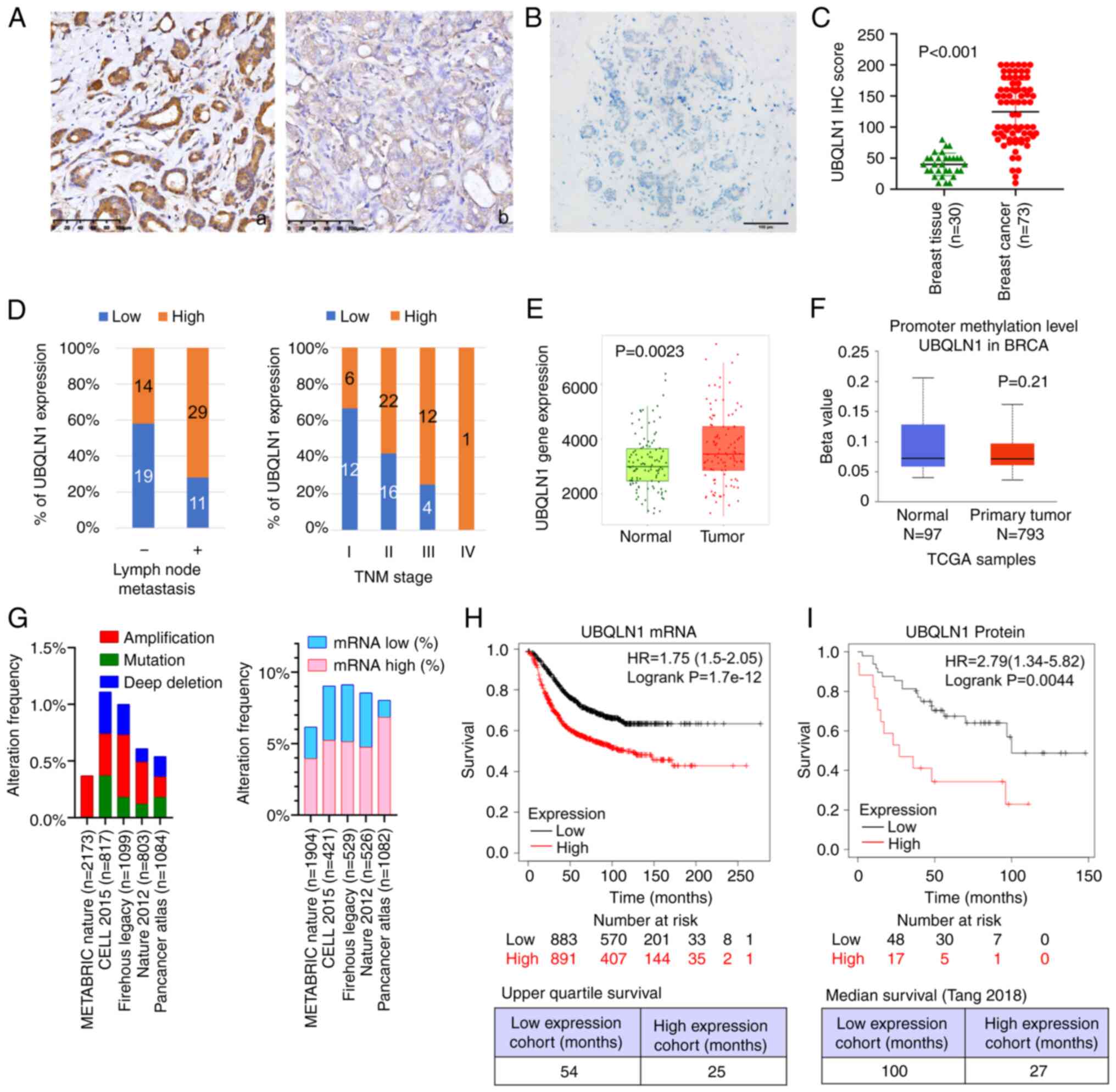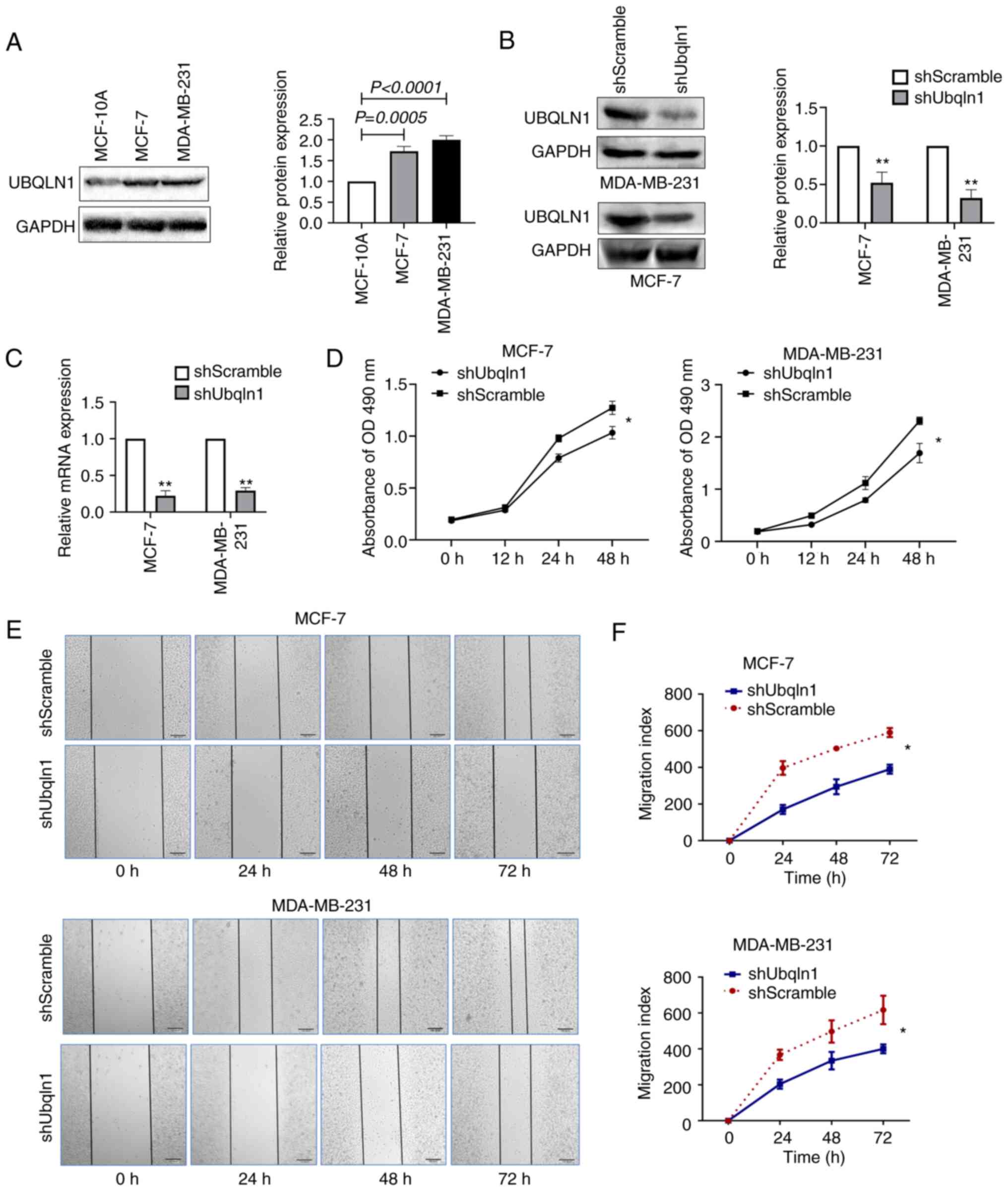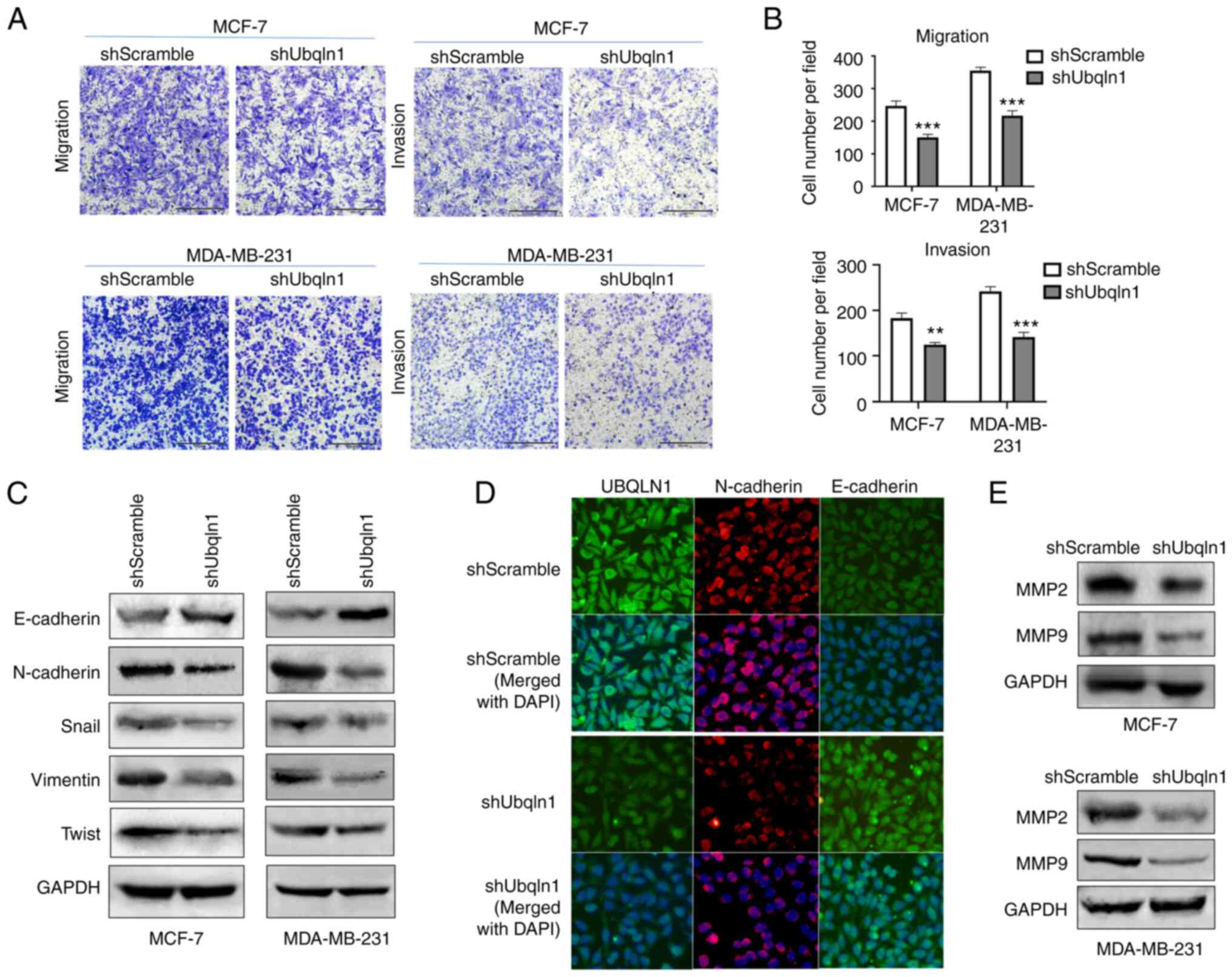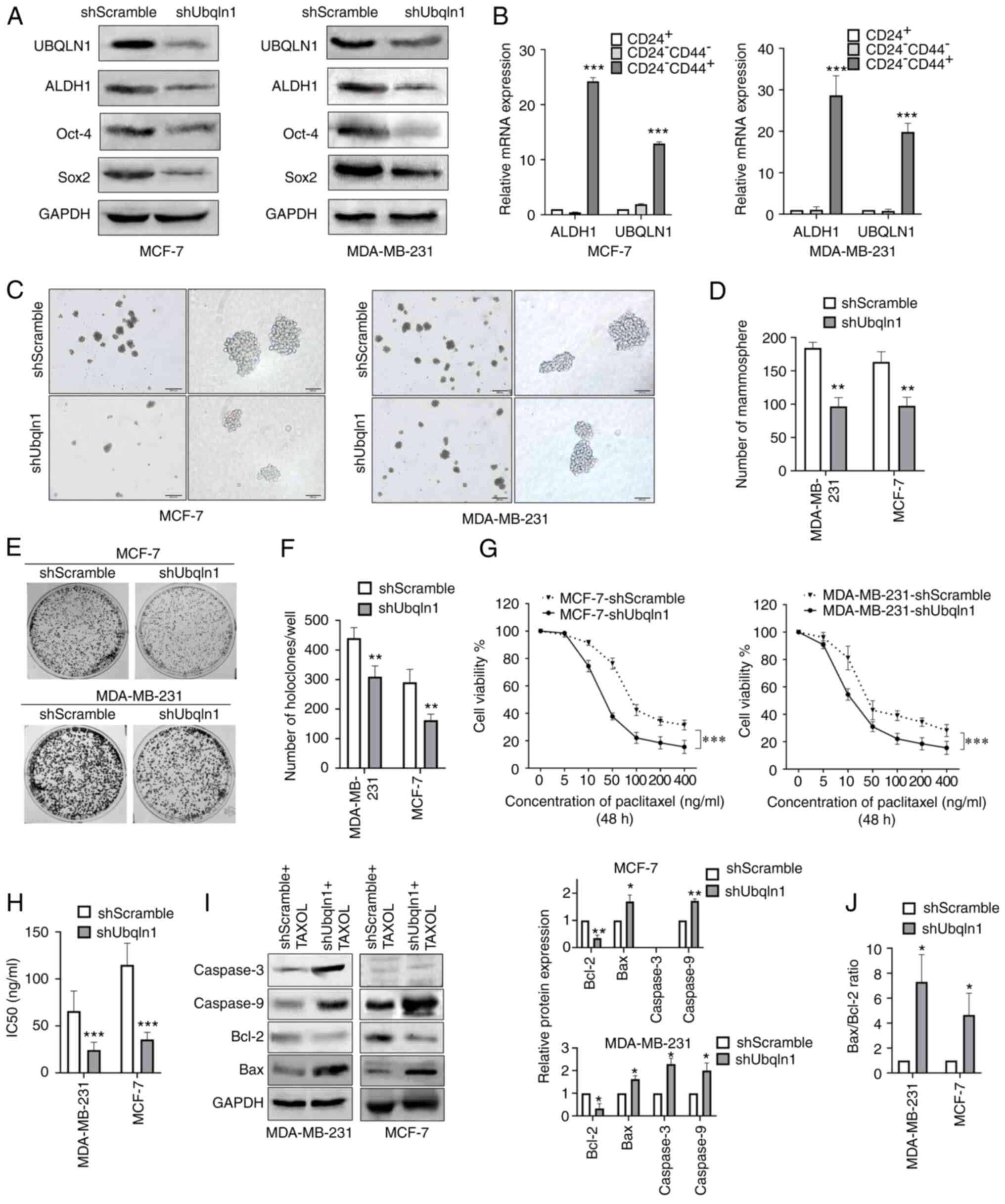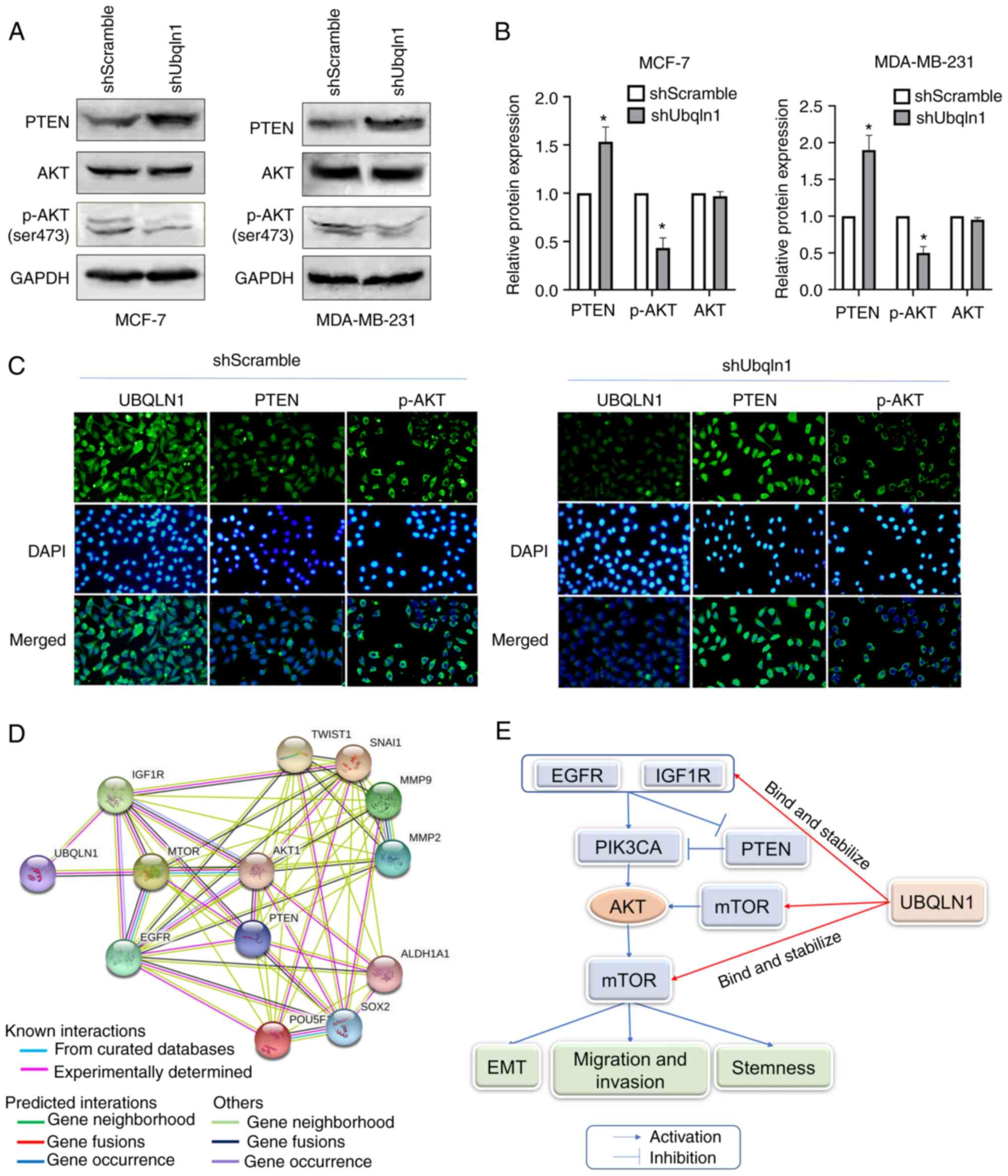|
1
|
Sung H, Ferlay J, Siegel RL, Laversanne M,
Soerjomataram I, Jemal A and Bray F: Global cancer statistics 2020:
GLOBOCAN estimates of incidence and mortality Worldwide for 36
cancers in 185 Countries. CA Cancer J Clin. 71:209–249. 2021.
View Article : Google Scholar : PubMed/NCBI
|
|
2
|
Thorat MA and Balasubramanian R: Breast
cancer prevention in high-risk women. Best Pract Res Clin Obstet
Gynaecol. 65:18–31. 2020. View Article : Google Scholar : PubMed/NCBI
|
|
3
|
Nandy SB and Lakshmanaswamy R: Cancer stem
cells and metastasis. Prog Mol Biol Transl Sci. 151:137–176. 2017.
View Article : Google Scholar : PubMed/NCBI
|
|
4
|
Najafi M, Farhood B and Mortezaee K:
Cancer stem cells (CSCs) in cancer progression and therapy. J Cell
Physiol. 234:8381–8395. 2019. View Article : Google Scholar : PubMed/NCBI
|
|
5
|
Yu X, Zhang F, Mao J, Lu Y, Li J, Ma W,
Fan S, Zhang C, Li Q, Wang B, et al: Protein tyrosine phosphatase
receptor-type δ acts as a negative regulator suppressing breast
cancer. Oncotarget. 8:98798–98811. 2017. View Article : Google Scholar : PubMed/NCBI
|
|
6
|
Shah PP, Lockwood WW, Saurabh K, Kurlawala
Z, Shannon SP, Waigel S, Zacharias W and Beverly LJ: Ubiquilin1
represses migration and epithelial-to-mesenchymal transition of
human non-small cell lung cancer cells. Oncogene. 34:1709–1717.
2015. View Article : Google Scholar : PubMed/NCBI
|
|
7
|
Karimi Roshan M, Soltani A, Soleimani A,
Rezaie Kahkhaie K, Afshari AR and Soukhtanloo M: Role of AKT and
mTOR signaling pathways in the induction of epithelial-mesenchymal
transition (EMT) process. Biochimie. 165:229–234. 2019. View Article : Google Scholar : PubMed/NCBI
|
|
8
|
Gonzalez DM and Medici D: Signaling
mechanisms of the epithelial-mesenchymal transition. Sci Signal.
7:re82014. View Article : Google Scholar : PubMed/NCBI
|
|
9
|
Tao C, Luo J, Tang J, Zhou D, Feng S, Qiu
Z, Putti TC, Xiang T, Tao Q, Li L and Ren G: The tumor suppressor
Zinc finger protein 471 suppresses breast cancer growth and
metastasis through inhibiting AKT and Wnt/β-catenin signaling. Clin
Epigenetics. 12:1732020. View Article : Google Scholar : PubMed/NCBI
|
|
10
|
Xia P and Xu XY: PI3K/Akt/mTOR signaling
pathway in cancer stem cells: From basic research to clinical
application. Am J Cancer Res. 5:1602–1609. 2015.PubMed/NCBI
|
|
11
|
Kurlawala Z, Saurabh K, Dunaway R, Shah
PP, Siskind LJ and Beverly LJ: Ubiquilin proteins regulate EGFR
levels and activity in lung adenocarcinoma cells. J Cell Biochem.
122:43–52. 2021. View Article : Google Scholar : PubMed/NCBI
|
|
12
|
Bao J, Jiang X, Zhu X, Dai G, Dou R, Liu
X, Sheng H, Liang Z and Yu H: Clinical significance of ubiquilin 1
in gastric cancer. Medicine(Baltimore). 97:e97012018.PubMed/NCBI
|
|
13
|
Jantrapirom S, Piccolo LL, Pruksakorn D,
Potikanond S and Nimlamool W: Ubiquilin networking in cancers.
Cancers (Basel). 12:15862020. View Article : Google Scholar : PubMed/NCBI
|
|
14
|
Kurlawala Z, Shah PP, Shah C and Beverly
LJ: The STI and UBA Domains of UBQLN1 are critical determinants of
substrate interaction and proteostasis. J Cell Biochem.
118:2261–2270. 2017. View Article : Google Scholar : PubMed/NCBI
|
|
15
|
Li X, Zhou J, Chen H, Wang F, Mei Q and
Sun H: The association between the UBQLN1 polymorphism and
Alzheimer's disease risk: A systematic review. Cell Mol Biol
(Noisy-le-grand). 63:94–96. 2017. View Article : Google Scholar : PubMed/NCBI
|
|
16
|
Kim SH, Shi Y, Hanson KA, Williams LM,
Sakasai R, Bowler MJ and Tibbetts RS: Potentiation of amyotrophic
lateral sclerosis (ALS)-associated TDP-43 aggregation by the
proteasome-targeting factor, ubiquilin 1. J Biol Chem.
284:8083–8092. 2009. View Article : Google Scholar : PubMed/NCBI
|
|
17
|
Safren N, El Ayadi A, Chang L, Terrillion
CE, Gould TD, Boehning DF and Monteiro MJ: Ubiquilin-1
overexpression increases the lifespan and delays accumulation of
Huntingtin aggregates in the R6/2 mouse model of Huntington's
disease. PLoS One. 9:e875132014. View Article : Google Scholar : PubMed/NCBI
|
|
18
|
Kurlawala Z, Dunaway R, Shah PP, Gosney
JA, Siskind LJ, Ceresa BP and Beverly LJ: Regulation of
insulin-like growth factor receptors by Ubiquilin1. Biochem J.
474:4105–4118. 2017. View Article : Google Scholar : PubMed/NCBI
|
|
19
|
Guidi F, Puglia M, Gabbiani C, Landini I,
Gamberi T, Fregona D, Cinellu MA, Nobili S, Mini E, Bini L, et al:
2D-DIGE analysis of ovarian cancer cell responses to cytotoxic gold
compounds. Mol Biosyst. 8:985–993. 2012. View Article : Google Scholar : PubMed/NCBI
|
|
20
|
Wang Y, Lu J, Zhao X, Feng Y, Lv S, Mu Y,
Wang D, Fu H, Chen Y and Li Y: Prognostic significance of
Ubiquilin1 expression in invasive breast cancer. Cancer Biomark.
15:635–643. 2015. View Article : Google Scholar : PubMed/NCBI
|
|
21
|
Hoffrogge R, Mikkat S, Scharf C, Beyer S,
Christoph H, Pahnke J, Mix E, Berth M, Uhrmacher A, Zubrzycki IZ,
et al: 2-DE proteome analysis of a proliferating and
differentiating human neuronal stem cell line (ReNcell VM).
Proteomics. 6:1833–1847. 2006. View Article : Google Scholar : PubMed/NCBI
|
|
22
|
Wang H, Zhang K, Liu Y, Fu Y, Gao S, Gong
P, Wang H, Zhou Z, Zeng M, Wu Z, et al: Telomere heterogeneity
linked to metabolism and pluripotency state revealed by
simultaneous analysis of telomere length and RNA-seq in the same
human embryonic stem cell. BMC Biol. 15:1142017. View Article : Google Scholar : PubMed/NCBI
|
|
23
|
Livak KJ and Schmittgen TD: Analysis of
relative gene expression data using real-time quantitative PCR and
the 2(-Delta Delta C(T)) Method. Methods. 25:402–408. 2001.
View Article : Google Scholar : PubMed/NCBI
|
|
24
|
Zhang F, Wang B, Qin T, Wang L, Zhang Q,
Lu Y, Song B, Yu X and Li L: IL-6 induces tumor suppressor protein
tyrosine phosphatase receptor type D by inhibiting miR-34a to
prevent IL-6 signaling overactivation. Mol Cell Biochem. 473:1–13.
2020. View Article : Google Scholar : PubMed/NCBI
|
|
25
|
Qin T, Li B, Feng X, Fan S, Liu L, Liu D,
Mao J, Lu Y, Yang J, Yu X, et al: Abnormally elevated USP37
expression in breast cancer stem cells regulates stemness,
epithelial-mesenchymal transition and cisplatin sensitivity. J Exp
Clin Cancer Res. 37:2872018. View Article : Google Scholar : PubMed/NCBI
|
|
26
|
Bartha Á and Győrffy B: TNMplot.com: A web
tool for the comparison of gene expression in normal, tumor and
metastatic tissues. Int J Mol Sci. 22:26222021. View Article : Google Scholar : PubMed/NCBI
|
|
27
|
Györffy B, Lanczky A, Eklund AC, Denkert
C, Budczies J, Li Q and Szallasi Z: An online survival analysis
tool to rapidly assess the effect of 22,277 genes on breast cancer
prognosis using microarray data of 1,809 patients. Breast Cancer
Res Treat. 123:725–731. 2010. View Article : Google Scholar : PubMed/NCBI
|
|
28
|
Tang W, Zhou M, Dorsey TH, Prieto DA, Wang
XW, Ruppin E, Veenstra TD and Ambs S: Integrated
proteotranscriptomics of breast cancer reveals globally increased
protein-mRNA concordance associated with subtypes and survival.
Genome Med. 10:942018. View Article : Google Scholar : PubMed/NCBI
|
|
29
|
Jia D, Park JH, Kaur H, Jung KH, Yang S,
Tripathi S, Galbraith M, Deng Y, Jolly MK, Kaipparettu BA, et al:
Towards decoding the coupled decision-making of metabolism and
epithelial-to-mesenchymal transition in cancer. Br J Cancer.
124:1902–1911. 2021. View Article : Google Scholar : PubMed/NCBI
|
|
30
|
Fu Y, Shao ZM, He QZ, Jiang BQ, Wu Y and
Zhuang ZG: Hsa-miR-206 represses the proliferation and invasion of
breast cancer cells by targeting Cx43. Eur Rev Med Pharmacol Sci.
19:2091–2104. 2015.PubMed/NCBI
|
|
31
|
Yu JM, Sun W, Wang ZH, Liang X, Hua F, Li
K, Lv XX, Zhang XW, Liu YY, Yu JJ, et al: TRIB3 supports breast
cancer stemness by suppressing FOXO1 degradation and enhancing SOX2
transcription. Nat Commun. 10:57202019. View Article : Google Scholar : PubMed/NCBI
|
|
32
|
Abu Samaan TM, Samec M, Liskova A, Kubatka
P and Büsselberg D: Paclitaxel's mechanistic and clinical effects
on breast cancer. Biomolecules. 9:7892019. View Article : Google Scholar : PubMed/NCBI
|
|
33
|
Jänicke RU: MCF-7 breast carcinoma cells
do not express caspase-3. Breast Cancer Res Treat. 117:219–221.
2009. View Article : Google Scholar : PubMed/NCBI
|
|
34
|
Beverly LJ, Lockwood WW, Shah PP,
Erdjument-Bromage H and Varmus H: Ubiquitination, localization, and
stability of an anti-apoptotic BCL2-like protein, BCL2L10/BCLb, are
regulated by Ubiquilin1. Proc Natl Acad Sci USA. 109:E119–E126.
2012. View Article : Google Scholar : PubMed/NCBI
|
|
35
|
Zhang X, Su Y, Lin H and Yao X: The
impacts of ubiquilin 1 (UBQLN1) knockdown on cells viability,
proliferation, and apoptosis are mediated by p53 in A549 lung
cancer cells. J Thorac Dis. 12:5887–5895. 2020. View Article : Google Scholar : PubMed/NCBI
|
|
36
|
Chen G, Wang X, Yu J, Varambally S, Yu J,
Thomas DG, Lin MY, Vishnu P, Wang Z, Wang R, et al: Autoantibody
profiles reveal ubiquilin 1 as a humoral immune response target in
lung adenocarcinoma. Cancer Res. 67:3461–3467. 2007. View Article : Google Scholar : PubMed/NCBI
|
|
37
|
Mittal V: Epithelial mesenchymal
transition in tumor metastasis. Annu Rev Pathol. 13:395–412. 2018.
View Article : Google Scholar : PubMed/NCBI
|
|
38
|
Agraval H and Yadav UCS: MMP-2 and MMP-9
mediate cigarette smoke extract-induced epithelial-mesenchymal
transition in airway epithelial cells via EGFR/Akt/GSK3β/β-catenin
pathway: Amelioration by fisetin. Chem Biol Interact.
314:1088462019. View Article : Google Scholar : PubMed/NCBI
|
|
39
|
Hanaoka E, Ozaki T, Ohira M, Nakamura Y,
Suzuki M, Takahashi E, Moriya H, Nakagawara A and Sakiyama S:
Molecular cloning and expression analysis of the human DA41 gene
and its mapping to chromosome 9q21.2-q21.3. J Hum Genet.
45:188–191. 2000. View Article : Google Scholar : PubMed/NCBI
|
|
40
|
Wu AL, Wang J, Zheleznyak A and Brown EJ:
Ubiquitin-related proteins regulate interaction of vimentin
intermediate filaments with the plasma membrane. Mol Cell.
4:619–625. 1999. View Article : Google Scholar : PubMed/NCBI
|
|
41
|
Gadhave K, Kumar P, Kapuganti SK, Uversky
VN and Giri R: Unstructured biology of proteins from
ubiquitin-proteasome system: Roles in cancer and neurodegenerative
diseases. Biomolecules. 10:7962020. View Article : Google Scholar : PubMed/NCBI
|
|
42
|
Zhang C and Saunders AJ: An emerging role
for Ubiquilin 1 in regulating protein quality control system and in
disease pathogenesis. Discov Med. 8:18–22. 2009.PubMed/NCBI
|
|
43
|
Heir R, Ablasou C, Dumontier E, Elliott M,
Fagotto-Kaufmann C and Bedford FK: The UBL domain of PLIC-1
regulates aggresome formation. EMBO Rep. 7:1252–1258. 2006.
View Article : Google Scholar : PubMed/NCBI
|
|
44
|
Regan-Klapisz E, Sorokina I, Voortman J,
de Keizer P, Roovers RC, Verheesen P, Urbé S, Fallon L, Fon EA,
Verkleij A, et al: Ubiquilin recruits Eps15 into ubiquitin-rich
cytoplasmic aggregates via a UIM-UBL interaction. J Cell Sci.
118((Pt 19)): 4437–4450. 2005. View Article : Google Scholar : PubMed/NCBI
|
|
45
|
Gao L, Tu H, Shi ST, Lee KJ, Asanaka M,
Hwang SB and Lai MM: Interaction with a ubiquitin-like protein
enhances the ubiquitination and degradation of hepatitis C virus
RNA-dependent RNA polymerase. J Virol. 77:4149–4159. 2003.
View Article : Google Scholar : PubMed/NCBI
|
|
46
|
Kleijnen MF, Shih AH, Zhou P, Kumar S,
Soccio RE, Kedersha NL, Gill G and Howley PM: The hPLIC proteins
may provide a link between the ubiquitination machinery and the
proteasome. Mol Cell. 6:409–419. 2000. View Article : Google Scholar : PubMed/NCBI
|
|
47
|
Mah AL, Perry G, Smith MA and Monteiro MJ:
Identification of ubiquilin, a novel presenilin interactor that
increases presenilin protein accumulation. J Cell Biol.
151:847–862. 2000. View Article : Google Scholar : PubMed/NCBI
|
|
48
|
Bedford FK, Kittler JT, Muller E, Thomas
P, Uren JM, Merlo D, Wisden W, Triller A, Smart TG and Moss SJ:
GABA(A) receptor cell surface number and subunit stability are
regulated by the ubiquitin-like protein Plic-1. Nat Neurosci.
4:908–916. 2001. View Article : Google Scholar : PubMed/NCBI
|
|
49
|
Wu S, Mikhailov A, Kallo-Hosein H, Hara K,
Yonezawa K and Avruch J: Characterization of ubiquilin 1, an
mTOR-interacting protein. Biochim Biophys Acta. 1542:41–56. 2002.
View Article : Google Scholar : PubMed/NCBI
|
|
50
|
Cao J and Yee D: Disrupting insulin and
IGF receptor function in cancer. Int J Mol Sci. 22:5552021.
View Article : Google Scholar : PubMed/NCBI
|
|
51
|
Santos ED, Nogueira KA, Fernandes LC,
Martins JR, Reis AV, Neto JB, Júnior IJ, Pessoa C, Petrilli R and
Eloy JO: EGFR targeting for cancer therapy: Pharmacology and
immunoconjugates with drugs and nanoparticles. Int J Pharm.
592:1200822021. View Article : Google Scholar : PubMed/NCBI
|
|
52
|
Gallardo A, Lerma E, Escuin D, Tibau A,
Muñoz J, Ojeda B, Barnadas A, Adrover E, Sánchez-Tejada L, Giner D,
et al: Increased signalling of EGFR and IGF1R, and deregulation of
PTEN/PI3K/Akt pathway are related with trastuzumab resistance in
HER2 breast carcinomas. Br J Cancer. 106:1367–1373. 2012.
View Article : Google Scholar : PubMed/NCBI
|
|
53
|
Trotman LC, Wang X, Alimonti A, Chen Z,
Teruya-Feldstein J, Yang H, Pavletich NP, Carver BS, Cordon-Cardo
C, Erdjument-Bromage H, et al: Ubiquitination regulates PTEN
nuclear import and tumor suppression. Cell. 128:141–156. 2007.
View Article : Google Scholar : PubMed/NCBI
|















